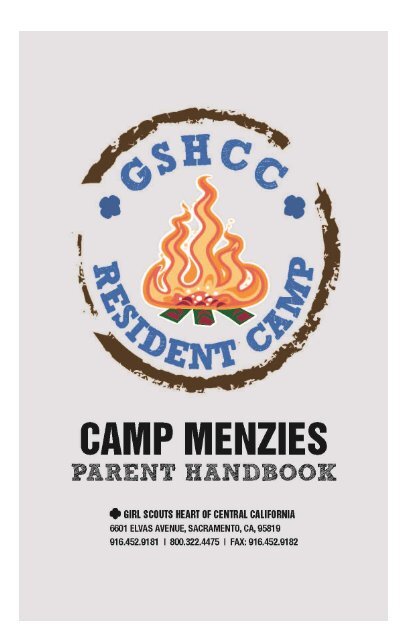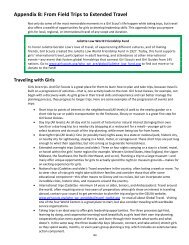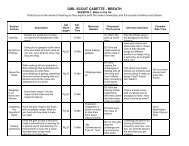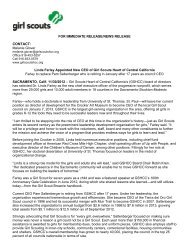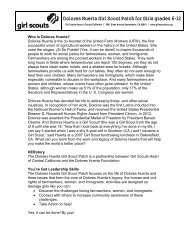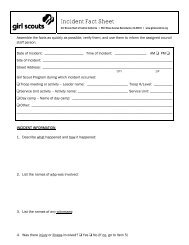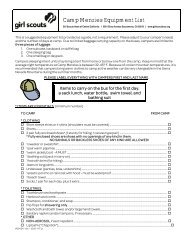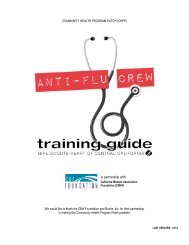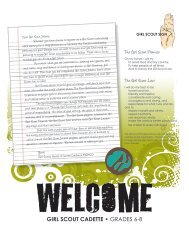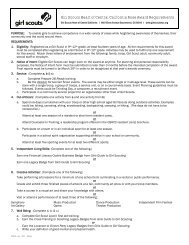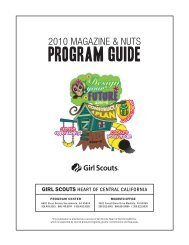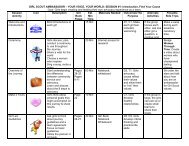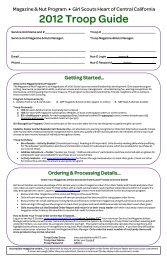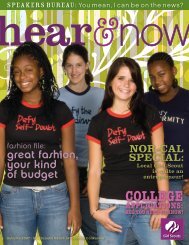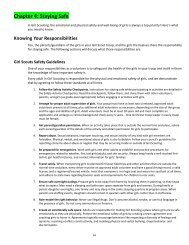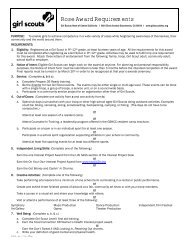Untitled - Girl Scouts Heart Of Central California
Untitled - Girl Scouts Heart Of Central California
Untitled - Girl Scouts Heart Of Central California
Create successful ePaper yourself
Turn your PDF publications into a flip-book with our unique Google optimized e-Paper software.
Contact Information:<br />
For questions about registration, payment or cancellation, please contact<br />
the Administration Department:<br />
(916) 452-9181<br />
(800) 322-4475<br />
For questions about camp program please contact the camp director:<br />
Program Specialist/Camp Menzies Director<br />
e-mail: campmenzies@girlscoutshcc.org<br />
Phone: (916) 452-9181 - Prior to June 1st<br />
(209) 795-2081 - After June 1st<br />
Emergency Numbers:<br />
Camp maintains a telephone line for business and emergencies. In the<br />
event of a family emergency, a message can be delivered to your camper<br />
upon request.<br />
Monday - Friday 8:00 a.m. – 5:00 p.m.<br />
Council (916) 452-9181 or (800) 322-4475<br />
Monday - Friday after 5:00 p.m. and Saturday - Sunday 24 hours<br />
Camp (209) 795-2081<br />
*Camp Address:<br />
[Camper’s Name]<br />
Camp Menzies<br />
c/o General Delivery<br />
Camp Connell, CA 95223<br />
Session #: [Program Name]<br />
*We CAN NOT receive UPS packages, if you need to get packages to your<br />
camper please contact camp to make arrangements.<br />
Parent Information Hotline<br />
We have a Parent information hotline parents can call for bus information or<br />
to receive a recorded message in case of emergency, such as a fire or other<br />
natural disaster. This hotline will be updated on bus days to include bus<br />
arrival and departure times as well as information about changes or delays.<br />
Please call (916) 453-5233, 45 minutes to an hour before your scheduled<br />
departure or arrival time to check on bus status. We also update the hotline<br />
on the first day of camp, after the buses have arrived in camp, so you can<br />
check when your camper arrived. In the case of an emergency the Parent<br />
Information Hotline will be updated to include information for parents.<br />
Please DO NOT leave phone messages on this line during the summer<br />
because we will not receive them.<br />
2
Table of Contents<br />
I. Facts about Menzies .............................................................. 4<br />
II. What is Camp Program? ......................................................... 4<br />
III. Preparing your Camper ........................................................... 4<br />
‣ Camp Counselors ........................................................... 5<br />
‣ Sleeping Accommodations ........................................... 6<br />
‣ Camper Behavior Expectations ..................................... 7<br />
‣ Cell Phones ..................................................................... 8<br />
‣ Camp Guidelines for Campers and the Internet .......... 8<br />
‣ Packing/Equipment List ............................................. 11<br />
‣ Camper Transportation ............................................... 12<br />
‣ What to expect on the first day .................................. 13<br />
‣ A Day in the Life of a Camper ..................................... 14<br />
‣ Health Services and Medications .............................. 17<br />
‣ Mealtimes and Food ................................................... 18<br />
‣ Laundry and Showers ................................................. 19<br />
‣ Animals and Insects .................................................... 19<br />
‣ Mail .............................................................................. 19<br />
‣ eCamp-one-way e-mail and photos ............................ 20<br />
‣ Birthdays ...................................................................... 21<br />
‣ The Last Day-Check-out procedures .......................... 21<br />
IV. CITs/WITs ............................................................................. 21<br />
V. Paperwork and Policies ....................................................... 23<br />
‣ Payment, Refunds and Cancellation .......................... 23<br />
‣ Visiting ......................................................................... 24<br />
‣ Camper Personal Information .................................... 24<br />
‣ Tips on Forms .............................................................. 25<br />
♦ Camper Health History and Exam Record .............. 26<br />
♦ Camper and Parent Letters to Counselors ............. 27<br />
♦ Horseback Riding Release/T-shirt Size Request .... 28<br />
♦ Camp Menzies Release Authorization .................... 28<br />
♦ Handbook Acknowledgement ................................. 29<br />
♦ Camper-Staff Contact Information .......................... 29<br />
‣ Final Mailing ................................................................ 30<br />
♦ Transportation Information & Luggage Tags .......... 30<br />
♦ Release of Liability Forms ........................................ 30<br />
VI. After Camp<br />
‣ Badgework ................................................................... 31<br />
‣ Lost and Found ........................................................... 31<br />
‣ Notes from Camp Staff ............................................... 32<br />
‣ Evaluations .................................................................. 32<br />
3
Facts about Menzies<br />
Camp Menzies is located at an elevation of 5,000 feet. The<br />
camp has an ideal summer climate with warm days and cold<br />
nights. The 175 acre wooded site has pine, cedar and fir trees.<br />
We have two waterfront areas, a canoe lake and a swimming<br />
hole; both areas are man-made but mimic natural bodies of<br />
water. We also have an arts and crafts center and a nature hut.<br />
What is Camp Program?<br />
Campers are placed in units based on the program they are<br />
registered for. Units have between 6 to 24 girls depending on<br />
the program. The ratio of staff to campers is two staff members<br />
to every 12 girls entering grades 2-3, two staff members to<br />
every 16 girls entering grades 4-6, two staff members to every<br />
20 girls entering grades 7-9, and two staff members to every 24<br />
girls entering grades 10-12. At camp, campers will have the<br />
opportunity to meet girls from all over Northern and <strong>Central</strong><br />
<strong>California</strong>. They will have a chance to be independent, to live in<br />
harmony with nature, and to share activities they will remember<br />
for years. Throughout camp, girls will learn new skills under the<br />
guidance of trained staff. Possible activities, planned with the<br />
campers, include archery (girls 4th grade and older), hiking,<br />
cooking, crafts, nature study, swimming (water temperature<br />
permitting), and canoeing (water level permitting).<br />
Preparing your Camper<br />
We are delighted that your camper has decided to join us this<br />
summer. Here are some tips to help make camp a positive<br />
experience:<br />
• Help your camper prepare for this big ADVENTURE by<br />
sharing in her excitement. She will make many new friends,<br />
live in a beautiful setting, and learn many new interesting<br />
things. Even though many girls wish it was......camp is NOT<br />
FOREVER!<br />
4
• If she has never been away from home, discuss it with her.<br />
Give her a chance to stay overnight at a friend’s house or at<br />
Grandma’s. Be supportive; listen to her fears and write her<br />
often at camp. Send a few items to make her sleeping area<br />
familiar – a small stuffed animal can work wonders! The<br />
American Camp Association has designed a free website<br />
specifically for parents and families,<br />
http://www.CampParents.org, which includes some great<br />
articles and tips on getting your camper ready for camp and<br />
dealing with homesickness.<br />
• Your camper is your treasure - and we try to treat her as<br />
such! If she has any medical, dietary, or behavioral needs,<br />
please let us know. The more we know about her, the more<br />
comfortable we can make her feel.<br />
Camp Counselors<br />
Camp staff members are enthusiastic, talented and caring<br />
adults, who are selected on the basis of their experience, ability<br />
to serve as role models and their genuine desire to work with<br />
children. Camp staff members include international staff as<br />
well as staff members from <strong>California</strong> and other states. The<br />
ratio of counselors to girls varies with the age of the campers.<br />
Camp units with younger girls have the greatest ratio of<br />
counselors to campers.<br />
Camp staff receive extensive on-site training prior to the arrival<br />
of all campers. Training includes activity programming and<br />
outdoor skills, songs, games, first aid and safety, team building,<br />
age level characteristics, how to deal with homesickness and<br />
more. Staff who supervise high adventure activities are<br />
required to have additional training and qualifications.<br />
Camp staff are hired because they enjoy working with children.<br />
It is council policy that staff are not allowed to receive money or<br />
gifts of monetary value from campers or parents.<br />
5
Sleeping Accommodations<br />
Unit placement is dependent on the type of program and the<br />
age of the girls. Depending on the unit, girls will stay in sleeping<br />
cabins, platform tents, under the stars or in a tent they have<br />
brought from home. Sleeping cabins are 16 x 20 cabins with<br />
screen doors and windows. Platform tents are 16 x 20 wooden<br />
frames with a canvas tent over the top of them. Both sleeping<br />
cabins and platform tents sleep 6 to 8 girls. <strong>Girl</strong>s sleeping<br />
under the stars can choose to bring their own tent from home or<br />
to sleep out. Campers sleeping out under the stars often share<br />
their living area with other programs of the same age. All units,<br />
including those sleeping under the stars, have metal beds and<br />
mattresses for campers to use. The type of sleeping<br />
accommodation is noted in the camp brochure at the end of<br />
each program description.<br />
6
Camper Behavior Expectations<br />
All of our camp rules, policies and safety regulations are in<br />
place to protect the safety and well being of our campers.<br />
Please take some time to review these behavior expectations<br />
with your camper so that they understand what is expected of<br />
them at camp. If you or your camper has any questions please<br />
feel free to contact the camp director.<br />
• Campers will be respectful, at all times, of themselves and<br />
others.<br />
• Campers will be respectful, at all times, of others’ personal<br />
property.<br />
• The use of alcohol, non-prescribed drugs and tobacco is<br />
strictly prohibited.<br />
• Campers will be respectful, at all times, of all camp property<br />
and equipment.<br />
• Campers are supervised at all times by the camp staff, and<br />
are expected to listen and pay attention to their<br />
counselors.<br />
• Electronic devices such as: cell phones, pagers, portable<br />
TVs, iPods, CD players, hand held video games etc., as<br />
well as weapons of any kind, are strictly prohibited.<br />
• During their camp session, campers will have the<br />
opportunity to participate in a variety of program activities<br />
(i.e., arts & crafts, nature, archery (4th grade and up),<br />
swimming, canoeing, horseback riding, etc.). Campers are<br />
expected to challenge themselves but will always have a<br />
choice in their level of participation.<br />
• Campers are required to participate in all camp safety<br />
discussions, emergency drills, meals, unit and all-camp<br />
Kapers.<br />
If a camper should have difficulty with these rules to the extent<br />
that the camp environment is no longer safe for her, other<br />
campers or the staff, she will be sent home. It is the<br />
7
esponsibility of the parents/guardians (or emergency contact,<br />
if parents/guardians cannot be reached) to pick up the camper<br />
from camp. In this situation no refund will be granted.<br />
Cell Phones<br />
As you know we have a “no-cell phone” rule at camp. Aside<br />
from the fact that cell phones are expensive and can get lost or<br />
stolen and that the physical camp environment is not kind to<br />
such items, there is a fundamental problem with campers<br />
having cell phones at camp, and that is trust. When children<br />
come to camp they—and you—are making a leap of faith,<br />
transferring their primary care from you as their parents to us<br />
and their counselors. This is one of the growth-producing, yet<br />
challenging aspects of camp. As children learn to trust other<br />
caring adults, they grow and learn, little by little, to solve some<br />
of their own challenges. We believe this emerging<br />
independence is one of the greatest benefits of camp. It is one<br />
important way your children learn to become resilient.<br />
Contacting you by phone essentially means they have not made<br />
this transition. It prevents us from getting to problems that may<br />
arise and addressing them quickly. Sending a cell phone to<br />
camp is like saying to your child that you as the parent haven’t<br />
truly come to peace with the notion of them being in our care.<br />
We agree to tell you if your child is experiencing a challenge<br />
with her adjustment to camp. You can help by talking with your<br />
child before she leaves for camp and telling that there is always<br />
someone she can reach out to, whether it is her counselor, a<br />
trusted activity leader, the Head Counselor, the Camp Director<br />
or camp health care provider. We are all here to help, but if you<br />
don’t trust us she certainly won’t.<br />
Camp Guidelines for Campers and the Internet<br />
As parents, we ask you to go over with your camper some<br />
guidelines we have developed about the Internet and other<br />
important issues so that everyone has the best experience at<br />
camp as possible.<br />
8
1) We view e-mail, IM and social networking sites, like<br />
Facebook.com and MySpace.com, as positive ways for<br />
you to express yourself and keep in touch with your<br />
friends. As a camper you have the right to exchange e-<br />
mails or IMs with other campers and invite other<br />
campers to be on your “friends” list in any way that you<br />
and your parents see fit.<br />
2) When it comes to exchanging contact with anyone on our<br />
staff, however, your parents must take full responsibility<br />
for you to do that. This includes giving or getting an e-<br />
mail or IM address, cell phone number, social<br />
networking profile, weblog or any other Internet contact.<br />
(We tell this to the staff during orientation). It’s not that<br />
we don’t think your relationships with your counselors<br />
are important. They are! It’s just that, once they leave<br />
camp, we can’t take responsibility for what happens<br />
between you and them—only your parents can. We have<br />
enclosed a parent communication permission form<br />
which your parents must sign before a counselor can<br />
give you any contact information or take any contact<br />
information from you. We recommend you look it over<br />
with them so you aren’t surprised by what it says.<br />
3) Regarding e-mails, IMs and comments you might make<br />
to other campers on their social networking site, we ask<br />
you:<br />
a) to keep what you say positive and respectful of<br />
staff and campers alike;<br />
b) not to use obscenities, vulgar or sexual language;<br />
c) not to say mean or threatening things to or about<br />
other campers or staff;<br />
d) not to post pictures online that would embarrass<br />
or violate anyone’s privacy;<br />
e) not to pose as another camper online or spread<br />
false information about anyone or say damaging<br />
or threatening things to or about anyone;<br />
f) not to use a website or blog or e-mail to talk<br />
about things that are against camp policy, like<br />
using drugs or alcohol or bullying or sexual things.<br />
9
4) Most Internet communication is positive, and that’s<br />
great! In the rare case where there might be any<br />
negative messages to other campers or staff, our policy<br />
is to call the parents of campers who send those<br />
messages and share the content with them.<br />
5) We will use any legal means available, including<br />
contacting the police and the FBI, to track the source of<br />
any offending or threatening Internet communication if<br />
we need to.<br />
6) We want you to be safe on the Internet. If you receive a<br />
threatening e-mail, IM or message on your personal<br />
website—one that is mocking, uses vulgar or harassing<br />
language—here is what you should do:<br />
a) Do not respond to the message or retaliate,<br />
because it might encourage the sender or get you<br />
into trouble.<br />
b) If possible, record the message onto your hard<br />
drive.<br />
c) Print out a copy of the message, then close it but<br />
do not delete it.<br />
d) Tell your parents about it and have them notify<br />
the local police or, if necessary, contact your<br />
Internet service provider (like yahoo, aol,<br />
earthlink, g-mail, etc.)<br />
e) If you suspect that the sender is from camp, call<br />
us immediately.<br />
f) Parents can also contact Pedowatch<br />
(www.pedowatch.com) or the National Center for<br />
Missing and Exploited Children (www.nemec.org).<br />
Camp is meant to be a fun, safe and happy place for all of<br />
us. We need your help to keep the way people from camp<br />
communicate with one another positive and in the spirit of<br />
camp—a way that makes everyone feel safe.<br />
© Copyright Bob Ditter, 2007. All Rights reserved. This letter may not be<br />
reproduced without the permission of the author. www.bobditter.com<br />
10
Clothing Guidelines<br />
For Safety Reasons: We require campers to wear sleeved shirts<br />
to prevent sunburn; please DO NOT send halter tops or tank<br />
tops. Campers are required to wear sturdy closed-toe shoes<br />
with a back at all times except when sleeping, grooming or at<br />
waterfront areas. We recommend hiking boots or tennis shoes.<br />
Campers MAY NOT wear Crocs, clogs, etc.<br />
Packing<br />
The equipment list (CM 24) can be found in the Preparing for<br />
Camp section on the girl side of our Web site<br />
www.girlscoutshcc.org. Amounts should be adjusted according to<br />
the number of days and the time of summer. The nights in June<br />
and early July can be cold. Please limit luggage to:<br />
THREE PIECES:<br />
1. One suitcase, backpack or duffel bag<br />
2. One sleeping bag<br />
3. One small bag or daypack<br />
<strong>Girl</strong>s sleeping under the stars can bring their own tent in<br />
addition to the other pieces of luggage. It is recommended that<br />
you and your camper set up the tent once at home so she<br />
understands how it is put up. Camp counselors will also be on<br />
hand to help them set it up in camp. Gear for girls sleeping<br />
under the stars is kept under their bed or in their tent. They<br />
may wish to bring a small tarp to set their bag on under the bed.<br />
In the event of rain we will set up additional tents or move girls<br />
into sheltered areas.<br />
Mark all items with your camper’s name. Clothing should be<br />
made of sturdy and washable fabric. <strong>Girl</strong>s and their clothes will<br />
get quite dirty, so old clothes are best. As hard as one tries,<br />
camp dirt never seems to come out. To assist your camper in<br />
returning home with the same belongings she brings to camp,<br />
you may wish to tape an equipment list inside her bag.<br />
11
Please leave the following at home:<br />
Cell phones<br />
Spray cans<br />
Glass bottles<br />
Valuable jewelry,<br />
watches, rings, necklaces<br />
Pets<br />
Food, snacks, and gum<br />
Expensive cameras<br />
Halter, sleeveless or tank tops<br />
Sandals or backless shoes<br />
Foot lockers<br />
Money (we have no camp store to<br />
purchase items)<br />
Televisions and radios<br />
Hand held video games<br />
CD’s, DVD’s, MP-3 players, and<br />
iPods<br />
We do not have the capability of storing these items for safe<br />
keeping at camp.<br />
Camper Transportation<br />
Riding the bus to camp is an enjoyable part of the camp<br />
experience. The ride provides an opportunity for the campers<br />
to start meeting new friends. For camper safety, all buses are<br />
chaperoned by camp or <strong>Girl</strong> Scout council staff. This service,<br />
which is included in the camp fees, is provided by a reputable<br />
and fully insured bus company. If we do not have enough<br />
campers to warrant using a bus and/or if we are over full at a<br />
certain bus stop campers may be transported in the camp’s 7,<br />
8 or 12-passenger vehicles (all camp drivers’ have a current<br />
driver’s license and have completed a special driver’s training<br />
in camp; 12-passenger vehicle drivers have a Class B,<br />
commercial drivers’ license with passenger endorsement).<br />
There is always one staff member in addition to the driver<br />
riding in the vehicles with the girls. Arrival and departure will<br />
be from the <strong>Girl</strong> <strong>Scouts</strong> HCC Program Center (6601 Elvas<br />
Avenue, Sacramento, 95819), the Stockton <strong>Of</strong>fice (7475<br />
Murray Dr, Suite 3 Stockton, 95210), the Modesto <strong>Of</strong>fice<br />
(3621 Forest Glenn Dr Modesto, 95355) or Angels Camp<br />
(Union/Utica Park). The following is the tentative departure<br />
12
and return times for each location, these times are subject to<br />
change, you will receive detailed instructions with specific<br />
departure times for your session 2 weeks prior to your camp<br />
session.<br />
Bus Stop Check-in & Board Return<br />
Angels Camp 10:30-11:00 AM 1:45-2:15 PM<br />
Modesto 8:30-9:00 AM 3:30-4:00 PM<br />
Sacramento 8:30-10:00 AM 3:30-4:30 PM<br />
Stockton 9:15-9:45 AM 3:45-4:15 PM<br />
To make it easier for the camper, campers should board and<br />
return to the same bus stop. All campers are expected to ride<br />
the camp bus. Special transportation requests MUST be<br />
approved through the council prior to camp. For additional<br />
transportation information, call the Program Center at (916)<br />
452-9181 or (800) 322-4475.<br />
What to expect on the first day<br />
Please be sure that your camper arrives at the bus stop dressed<br />
for camp. She should be wearing a sleeved shirt, closed-toe<br />
shoes with backs and socks. You should plan on arriving at the<br />
camp bus stop thirty to forty-five minutes before the scheduled<br />
departure time. At the bus stop, when you drop your camper<br />
off, you will be asked to sign in with council or camp staff. They<br />
will collect any medications you have for your camper. After<br />
that you will put your luggage in a designated spot. Camp<br />
buses are chaperoned to camp by Camp Staff or <strong>Girl</strong> Scout<br />
council staff. When your camper arrives in camp she will eat<br />
the lunch she brought from home with the rest of her unit and<br />
her counselors. After lunch, campers spend the day getting<br />
familiarized with camp. They will visit the swimming hole for a<br />
swim assessment, the health center for a health check and go<br />
to the dining hall to learn dining hall procedures. They will also<br />
go to all of the program areas to plan what activities they would<br />
like to do during their camp session. Settling into their unit and<br />
playing “get to know you games” are also a big part of the first<br />
day.<br />
13
Bus/Van Safety Procedures<br />
The following is a list of safety procedures to follow when<br />
dropping off or picking up campers:<br />
• Parents and/or Guardians are responsible for the<br />
supervision of their campers and any siblings at all times<br />
at the bus stop areas. Please do not leave until your<br />
camper has boarded the bus.<br />
• Pets need to stay in the comfort of their own home, or<br />
backyard.<br />
• Please refrain from smoking at the bus stops.<br />
• Alcoholic beverages are NOT allowed at the bus stops.<br />
• Drive slowly and watch for pedestrians when you are in<br />
the parking lots and near the bus stop.<br />
A Day in the Life of a Camper<br />
Campers get up about 7 a.m. and go to bed around 9-10 p.m.<br />
depending upon their age. An hour after lunch each day is<br />
reserved for “quiet time” to allow the girls time to relax.<br />
The rest of the day is spent in programs planned by the<br />
campers on the first day with guidance from unit staff. Most<br />
activities are done in their unit groups. Units are split in half, or<br />
in thirds, for some of the activities depending on the size of the<br />
unit and the activities in which they are participating.<br />
A certain amount of time each day is set-aside for “Kapers” –<br />
chores that help the camp stay clean. Some of the Kapers<br />
include tent, trash, and bathroom cleanup, wood gathering,<br />
washing dishes, conducting flag ceremonies, setting the dining<br />
tables and bringing food from the kitchen to the table.<br />
<strong>Girl</strong>s participating in the shorter 4 and 5 day sessions usually<br />
participate in each camp activity one time. <strong>Girl</strong>s attending the<br />
longer sessions often have the opportunity to participate in<br />
some of the activities several times.<br />
During each session we have at least one all-camp campfire, an<br />
all-camp event and a theme meal. Campfires are held at Pine<br />
Haven around dusk. They include songs, skits and laughter.<br />
14
The camper council, a group that includes representatives from<br />
each unit, plans all camp events and theme meals. Some of<br />
the events and theme meals we have had in the past include:<br />
dance parties, fairytale dinners, pajama breakfasts, all camp<br />
capture the flag and more.<br />
15
Basic Daily Schedule<br />
7:00 a.m. Bell Rings to wake everyone up<br />
7:45 a.m. Morning Flag (ceremonies are performed<br />
by different units each day)<br />
8:00 a.m. Breakfast (after meals campers help to<br />
clean up by washing dishes, wiping<br />
tables or sweeping the dining hall)<br />
9:00 a.m. Morning Session 1*<br />
10:15 a.m. Morning Session 2*<br />
11:15 a.m. Unit Time<br />
12:00 p.m. Lunch<br />
1:00 p.m. Me Time (time to relax, read a book or<br />
write letters)<br />
2:00 p.m. Afternoon Session 1*<br />
3:00 p.m. Snack<br />
3:15 p.m. Afternoon Session 2*<br />
4:30 p.m. Afternoon Session 3*<br />
5:30 p.m. Unit Time<br />
6:00 p.m. Evening Flag<br />
6:10 p.m. Dinner<br />
7:30 p.m. Evening Program (Campfire, All Camp<br />
Event or special unit activity)<br />
9:00 p.m. Bedtime for younger girls<br />
10:00 p.m. Bedtime for older girls<br />
* Activity sessions include swimming, canoeing, archery (for<br />
Juniors and up), arts and crafts, nature study, meadow games,<br />
horseback riding, and other special activities they have planned<br />
to do as a unit. Each unit plans and cooks out at least one<br />
meal while they are at camp. To conserve water, campers<br />
shower every other day that they are in camp or the day they<br />
return from a trip and every other day before and after that.<br />
If groups are leaving on a trip, some of their time in camp is<br />
spent planning and preparing for the trip and cleaning up when<br />
they come back.<br />
16
Health Screenings, Services, Medications and Allergies<br />
Health Screenings<br />
In compliance with American Camp Association standards, all<br />
campers will receive a brief health screening by the health staff<br />
upon arrival at camp. The purpose of the screening is to<br />
identify any evidence of illness and to review health history and<br />
medication(s). Parents will be notified of any unusual findings.<br />
Health Services<br />
Camp Menzies has a qualified health care manager on-site and<br />
staff are trained in First Aid. A doctor is on-call if illness or injury<br />
requires additional medical attention. Parents will be notified in<br />
the event of an emergency. The health care manager<br />
administers routine health care and medications.<br />
If your camper becomes ill or is injured (seriously enough to be<br />
taken to the doctor, or to spend more than a few hours in the<br />
infirmary) you will be notified. If your daughter returns from<br />
camp with complaints of injury, please contact the <strong>Girl</strong> <strong>Scouts</strong><br />
<strong>Heart</strong> of <strong>Central</strong> <strong>California</strong> Program Center within 48 hours.<br />
Medications<br />
The “Patch ‘n’ Go” (infirmary) is staffed by qualified health staff<br />
that administers all medications. The State of <strong>California</strong>, <strong>Girl</strong><br />
<strong>Scouts</strong> of the USA, and the American Camp Association require<br />
that all medications (prescription and over-the-counter) are kept<br />
locked in the infirmary, including itch relieving creams,<br />
antibiotic ointment, and any vitamins or homeopathic remedies.<br />
The only exceptions are medications that would be needed<br />
immediately such as asthma inhalers and epinephrine. All<br />
prescription and over-the-counter medication needs to be in the<br />
original container with the camper’s name and address, plus<br />
complete directions for use on the container. <strong>California</strong> State<br />
law DOES NOT allow us to distribute prescription medications to<br />
anyone besides the person listed on the medication. Please list<br />
all medications you are sending and directions for use on the<br />
17
Camper Health History and Exam Record. If medication is not<br />
necessary please do not send it. Our infirmary keeps basic<br />
over-the-counter medications such as Tylenol®, Advil®,<br />
Benadryl®, Tums®, cough syrup, throat lozenges, antibiotic<br />
ointment, calamine lotion, etc. on hand.<br />
Allergies<br />
If your camper has food, pollen, insect, medication, or other<br />
allergies, please note these on her health form with specific<br />
information about what the reaction is if she is exposed to the<br />
allergen. If your camper has a food allergy please contact the<br />
camp director at campmenzies@girlscoutshcc.org, at least 2<br />
weeks prior to her session so the kitchen and unit staff can be<br />
prepared.<br />
Mealtimes and Food<br />
Most meals are served family style under a tent. One to two<br />
staff members sit at a table with six to seven campers. Meal<br />
times are approximately 8:00 a.m., 12:00 p.m., and 6:15 p.m.<br />
A healthy snack is served at 3:00 p.m. There may be meals<br />
your camper might not like. Please help her understand that we<br />
try to satisfy many tastes. We encourage campers to try a little<br />
bit of everything. After campers have tried the food and if they<br />
still don’t like it they have the option of having cereal at<br />
breakfast or a sandwich at lunch or dinner.<br />
We strive to provide healthy meals and snacks. Fresh food is<br />
delivered weekly. Our kitchen staff strives to make sure all<br />
meals are fresh, nutritionally balanced, attractive, and tasty.<br />
Special diets can be accommodated on an individual basis.<br />
Please contact the Camp Director regarding any special needs<br />
prior to camp: campmenzies@girlscoutshcc.org.<br />
Please do not send food with your camper.<br />
18
Laundry and Showers<br />
We do not have laundry facilities for campers. Be sure to send<br />
enough clothes to last for the entire session. To conserve<br />
water, campers shower every other day while they are in camp.<br />
Animals and Insects<br />
We do have animals at Camp Menzies – both large and small.<br />
The peskiest are the mosquitoes. It is recommended that your<br />
camper wear long sleeves and long pants at dawn and dusk<br />
when mosquitoes are most active. They should also bring NON-<br />
AEROSOL insect repellent that contains 10-30% DEET. Camp<br />
counselors will make every effort to remind campers to apply<br />
repellent throughout the day.<br />
All campers receive an animal orientation upon arrival at camp.<br />
The orientation includes educational and procedural<br />
information on bears, cows, mountain lions, frogs, snakes, and<br />
other known inhabitants that have been seen in or around<br />
camp.<br />
Mail<br />
Mail becomes very important to girls away from home. Mail<br />
service to camp can be slow. We suggest you send a letter the<br />
day before she leaves for camp, so that it arrives before she<br />
heads home. Mail is delivered after lunch during the camper<br />
rest period. Because the first day of camp schedule is different,<br />
no mail is delivered to campers on the first day of the session,<br />
except for the Camp Comfort kits sold by the <strong>Girl</strong> Scout Shop<br />
Please address mail for USPS delivery to:<br />
[Camper’s Name]<br />
Camp Menzies<br />
c/o General Delivery<br />
Camp Connell, CA 95223<br />
Session #: [Program Name]<br />
The Session # and Program Name MUST be on the envelope to<br />
ensure the camper receives her mail.<br />
19
Positive, upbeat letters help to prevent homesickness. Save<br />
the less cheerful news until she returns home. Include selfaddressed,<br />
stamped envelopes and postcards in her luggage so<br />
that you will receive mail too!<br />
Packages<br />
We CAN NOT receive UPS packages. If you need to send a<br />
package to your camper please contact camp to make<br />
arrangements or use the bus mail box. Healthy snacks are<br />
provided, so please do not send packages of goodies (our yearround<br />
resident campers, the four-footed variety, like your<br />
snacks too!).<br />
Bus Mail Box<br />
SAVE YOURSELF POSTAGE!<br />
A mailbox will be available on check-in day for your camper’s<br />
mail (name, session # and program name must be on the<br />
envelope). Please make a note on each envelope which day<br />
you want the letter delivered (day 2, day 3, etc.).<br />
eCamp-one-way e-mail and photos<br />
Camp Menzies uses an internet program created and managed<br />
by eCamp, a camp based technology firm. Parents can log on<br />
to a password protected Web site to see pictures and news<br />
from camp for free. Each unit has a camera that camp staff<br />
use to take pictures of their unit daily. Pictures for each unit<br />
are posted on the Web site once a day (times vary for each unit,<br />
but usually new pictures are posted in the evening after dinner<br />
or in the morning after breakfast). There are days that due to<br />
technical difficulties with our computers, or with the cameras,<br />
we do not get photos posted for every unit. We cannot post<br />
photos of campers on our travel sessions until they return to<br />
camp from their trip. Although we try our best, we cannot<br />
guarantee that we will get a picture of every camper, every day.<br />
For a small fee, parents can set up a one-way e-mail account for<br />
their camper through the e-camp web site. E-mails are printed<br />
once a day at 10:00 AM and distributed during mail call after<br />
lunch, e-mails sent after 10:00 AM will not be printed until the<br />
20
following day. <strong>Girl</strong>s will not be able to receive e-mails when they<br />
are out of camp on trips. Only parents with campers registered<br />
for camp will be able to sign-up for these services. There will be<br />
a flyer on how to register for eCamp in the second mailing.<br />
Birthdays<br />
We will celebrate your camper’s birthday with other birthdays<br />
occurring during the same session during a special meal on the<br />
last night at camp. We can also arrange for the unit to have a<br />
special celebration on the day of your camper’s birthday if we<br />
are given advance notice.<br />
The Last Day-Check-out procedures<br />
Campers spend the last day packing up, cleaning the camp,<br />
taking photos and reflecting on their session at a “<strong>Girl</strong> Scout’s<br />
Own” ceremony.<br />
For the safety of all our campers we have very specific checkout<br />
procedures at the bus stops:<br />
• Adults, who arrive before the bus (in Sacramento,<br />
Modesto and Stockton only) can pre-check out their<br />
camper, pick up their patch and year strip and wait in<br />
the waiting zone.<br />
• Adults will need to show photo ID when they are signing<br />
their campers out. Only adults listed on the release<br />
authorization form will be able to pick up campers.<br />
• When the buses arrive and the luggage has been<br />
unloaded, the names of all campers who have been prechecked<br />
out will be read and those girls can meet the<br />
adult picking them up in the waiting zone.<br />
• Adults who have not pre-checked out their camper will<br />
need to check them out. Staff will then release the<br />
camper.<br />
Counselors in Training (CIT) & Wranglers in Training (WIT)<br />
The Counselor in Training (CIT) & Wranglers in Training (WIT)<br />
programs have been designed for girls entering Grades 10-12<br />
who are interested in improving their leadership skills and<br />
21
working with younger girls in the camp setting. There are three<br />
levels to the CIT program: CIT, Advanced CIT and Apprentice<br />
CIT. Currently there is one level of the WIT program.<br />
During the first level of CIT/WIT, girls will focus on <strong>Girl</strong> Scout<br />
and age level appropriate programming, girl characteristics, and<br />
basic knowledge of camp operations, current social issues,<br />
leadership skills, group dynamics and decision-making. They<br />
will have the opportunity to work with our younger units for a<br />
few hours at a time during their sessions. WITs will spend time<br />
shadowing the horseback riding staff.<br />
Advanced CITs will focus on camp management and gain<br />
practical experience in various areas of the camp operation.<br />
Advanced CITs will shadow our maintenance, kitchen,<br />
administrative, specialty and unit staff. They will also have the<br />
opportunity to visit other camps in northern <strong>California</strong> to see<br />
how they are managed. Finally they will practice leadership and<br />
program skills while working with younger campers in specialty<br />
areas and units.<br />
Apprentice CITs will enhance their knowledge of camp program<br />
and management through individualized participation in an<br />
internship program. Throughout the program specific focus will<br />
be placed on advanced risk management, legal issues,<br />
supervision, career exploration, and diversity awareness.<br />
The Leadership Director and Leadership Assistant supervise the<br />
CITs & WIT’s. They live in their own unit, Forest Hill. CIT’s/WIT’s<br />
spend increasingly more time working with younger units at<br />
each level. CITs/WITs are not counted as ratio and will never be<br />
left alone with a group of girls. They have their own set of<br />
guidelines, which is included in the CITs/WITs information<br />
packet.<br />
22
Paperwork and Policies<br />
Payment<br />
The balance of the CAMP FEES ARE DUE no later than 4 (four)<br />
weeks prior to the start of the session. Please see the<br />
Important Dates to Remember flyer for your specific due date.<br />
Your camper will lose her place in the camp session/program if<br />
payment is not received by the due date. With your payment,<br />
include cookie credits and/or financial aid certificate. If you are<br />
paying by MasterCard, Discover, or Visa, complete the credit<br />
card section on your billing statement and mail it to the<br />
Program Center: <strong>Girl</strong> <strong>Scouts</strong> <strong>Heart</strong> of <strong>Central</strong> <strong>California</strong>, 6601<br />
Elvas Avenue, Sacramento, CA 95819.<br />
Our council will accept partial payments. Payments must be a<br />
minimum of $50. Full payment still must be received four<br />
weeks before the opening day of the camp session you have<br />
choosen. You must track your own payments, additional bills<br />
will not be sent.<br />
Refunds and Cancellation<br />
If your selected camps are full, and no alternative can be found,<br />
or if the financial aid amount requested is not fully granted, the<br />
total amount paid will be refunded.<br />
A portion of the camp fee (minus $25.00) will be refunded only<br />
if:<br />
• Family plans change and the camper can no longer<br />
attend (in this case, written notification must be received<br />
four weeks before the opening date of the confirmed<br />
camp session);<br />
• The camper does not attend due to illness or injury (A<br />
letter from a physician must accompany the refund<br />
request);<br />
• The camper is sent home from camp due to illness or<br />
injury (refunds are prorated in such cases and will be<br />
made only at the request of the parent).<br />
23
No refunds will be made if the camper leaves early for any other<br />
reason. Refund requests must be received by October 1, 2011.<br />
There are THREE ways to cancel from a camp session:<br />
1. Mail your cancellation request to <strong>Girl</strong> <strong>Scouts</strong> <strong>Heart</strong> of <strong>Central</strong><br />
<strong>California</strong>, 6601 Elvas Avenue, Sacramento, CA 95819.<br />
2. Fax your cancellation to (916) 452-9182.<br />
3. E-mail your cancellation to cancel@girlscoutshcc.org<br />
Please verify with the Administration Department that your<br />
cancellation notice has arrived.<br />
Visiting<br />
We ask that parents do not visit while their camper is at camp.<br />
Visits often upset camp routine and trigger homesickness in<br />
campers. We would, however, like to invite you to our Annual<br />
Open House in June. Bring a picnic lunch and enjoy the<br />
beautiful setting. A map to Camp Menzies has been included in<br />
the confirmation packet. When planning your open house visit<br />
please remember the following:<br />
• Pets need to stay in the comfort of their own home.<br />
• Camp Menzies is a smoke free environment. Please<br />
adhere to our “no smoking policy.”<br />
• Alcoholic beverages are not allowed on the property.<br />
• Please wear closed-toe shoes, as the terrain is rocky.<br />
Camper Personal Information<br />
On several of our forms we have requested some important<br />
personal information. As seasoned camp professionals, we<br />
want your camper to have a smooth and happy adjustment to<br />
their camp environment – something we know all parents and<br />
guardians want too. It is our experience that some parents<br />
hesitate to provide the requested information for fear the<br />
information may be misused, while others may be concerned<br />
about their child being labeled, singled out, or treated<br />
differently. All adults want to see their camper have a strong,<br />
fresh start at camp, unencumbered by past problems and we<br />
24
share these concerns. Children need us to be partners in<br />
providing a safe and successful summer.<br />
Prior knowledge about a learning difficulty, ADHD (Attention<br />
Deficit Hyperactivity Disorder), a bedwetting problem, recent<br />
loss or major change in the family or child’s life makes a<br />
tremendous difference in helping us to be sensitive to your<br />
camper’s need for extra patience, understanding, and<br />
reassurance – especially during the first few days of camp. For<br />
campers who have attention problems or who are nervous<br />
about new experiences this is especially true. Children often<br />
will use behavior rather than words to tell us something is<br />
bothering them. If we have advanced knowledge of areas that<br />
might be difficult for your camper, it will help us to better<br />
understand her needs. The better we understand her, the more<br />
we can assure you of a better program for her.<br />
Our commitment is to use personal information only to help<br />
your child adjust to camp. Please know that we take the privacy<br />
of your daughter’s health issues very seriously, only those camp<br />
personnel who have a need to know will have access to any of<br />
the medical information provided. It will never be used at camp<br />
unless necessary, and then only with the greatest of discretion.<br />
We can help your child have a great summer camp experience if<br />
you help us. We encourage you to make us a full partner in<br />
providing for your camper.<br />
Tips on Forms<br />
All of our camp forms are very important, they help us to plan<br />
for the camp sessions and better prepare for your camper.<br />
Please complete all of the forms and send them in at least four<br />
weeks prior to the start of your camper’s session (see the<br />
Important Dates to Remember flyer for your specific due date).<br />
Because we want forms to have the most current information<br />
they will not be accepted before May 1.<br />
25
Camper Forms<br />
Camper forms as well as the Camp Menzies equipment list are<br />
available on our website www.girlscoutshcc.org under Preparing<br />
for Camp in the Resident Camp section, you can also type in the<br />
following link:<br />
http://www.girlscoutshcc.org/gshccadmin/site1/girlscouts/ca<br />
mp/residentCamp_Paperwork.asp#camp. If you are unable to<br />
download the forms and wish to have a forms packet mailed to<br />
you please e-mail campmenzies@girlscoutshcc.org or call (916)<br />
452-9181/ (800) 322-4475. Please use the forms checklist<br />
you received in your first mailing and review the following<br />
information when completing these forms.<br />
Note for campers attending more than one session at Camp<br />
Menzies:<br />
It is not necessary for you to complete all the forms for each<br />
session your camper is attending. You only need to complete<br />
one copy of CM-23-Camper Health History, CM-28-Parent<br />
Handbook Acknowledgement and Contact Information and CM-<br />
29-Horseback Riding Release & T-shirt Size Request. On each<br />
of these forms please include the names and numbers of all the<br />
sessions your camper is attending. Please complete a different<br />
copy of CM 21-Parent Letter to Counselor, CM-26-<br />
Transportation Information and Release Authorization and CM<br />
31-Letter to My Counselors for each session the camper is<br />
attending (photo copies are acceptable but please include a<br />
copy for each session your camper is attending with the correct<br />
session name and number on it).<br />
Camper Health History and Exam Record (CM 23)<br />
Health History<br />
The State of <strong>California</strong>, <strong>Girl</strong> <strong>Scouts</strong> of the USA, and the<br />
American Camp Association require each camper to have a<br />
current Health History on file that is filled out and signed by the<br />
parents no more than 2 months prior to their camp session.<br />
Because of this guideline please do not complete and mail in<br />
this form prior to May 1.<br />
26
Immunization History<br />
Please attach a copy of your camper’s immunization history or<br />
provide immunization dates on the Camper Health History and<br />
Exam Record. If you wish to request an exemption to the<br />
immunizations please contact the Program Center to request an<br />
Immunization Release Form (#CM 32).<br />
Physical Exam<br />
<strong>Girl</strong> <strong>Scouts</strong> of the USA and the American Camp Association<br />
require each camper to have had a physical exam within the<br />
past 24 months. A licensed physician, physician’s assistant or<br />
nurse practitioner can perform the physical. If your child has<br />
had a physical in the last 24 months you do not need to<br />
schedule a special physical just for camp. You can attach the<br />
school or sports physical record or have the doctor fill in the<br />
physician’s statement on the back of the Camper Health History<br />
and Exam Record with the results of the latest physical. We<br />
have forms on file at the Program Center for those campers<br />
who attended camp last summer, if that physical is still current<br />
we can pull the form for you but you will still need to complete<br />
and sign the health history portion of the form so it is current.<br />
Please call the Program Center (916) 452-9181 or (800) 322-<br />
4475 at least two weeks before the camp session if you wish<br />
them to pull your form. If your camper has not had a physical in<br />
the last 24 months try to schedule one at least 4 weeks prior to<br />
their camp session so you can send your paperwork in on time.<br />
Exemption<br />
If you wish to request an exemption to waive the health exam<br />
and/or medical treatment, please contact the Program Center<br />
to obtain a Religious Medical Exemption Form (#CM 33).<br />
Waivers must be signed by a religious official indicating<br />
membership in the religious group named.<br />
Camper and Parent Letter to Counselors (CM 21 and CM 31)<br />
The letters from the parent and camper will help camp staff to<br />
“get acquainted” with each camper prior to camp. This<br />
27
information will help us provide a positive camp experience for<br />
your camper. Please complete both sides and feel free to<br />
attach additional sheets if necessary. The more information<br />
you give the staff, the better prepared they are for your camper.<br />
Horseback Riding Release/T-shirt Size Request (CM 29)<br />
Camp Menzies offers basic horseback riding instruction.<br />
Campers can select from two levels – beginning and<br />
intermediate. The one-hour beginning riding sessions is<br />
included in the camp fee. This ride includes a safety orientation<br />
and arena instruction for all ages. <strong>Girl</strong>s in 4 th grade and older<br />
will also go on a short trail ride. The two-hour intermediate<br />
class which includes basic horsemanship safety and an<br />
extended trail ride can be chosen for an additional fee. The<br />
intermediate class is for an experienced rider and is only<br />
available to campers age 10 and older. All campers need to<br />
complete the Horseback Riding Release & T-shirt size request<br />
form even if they are participating in a horse camp session or<br />
are not planning to ride. Payment for intermediate rides must<br />
be included with the form and needs to be received by the<br />
office 4 weeks in advance of the session. (Please note:<br />
Intermediate rides are not available during 4 and 5-day<br />
sessions and that additional riding sessions are not available<br />
for girls attending horseback riding programs).<br />
Camp Menzies Release Authorization (CM 26)<br />
So that we can plan for the appropriate number of buses we<br />
need to know which bus stop your camper will be departing<br />
from and the stop she will be returning to. (More information<br />
on bus transportation can be found on page 12). Each camper<br />
will need to be signed out by an authorized adult when they<br />
return from camp. To ensure that each camper is picked up by<br />
an authorized adult we require you to hand in a Release<br />
Authorization form which includes the names of all adults<br />
(including parents) who are authorized to pick up the camper.<br />
Be sure to include the names of individuals who might pick up<br />
your camper in case of an emergency. A photo ID will be<br />
required to verify that you are authorized to pick up the camper.<br />
28
A delay will occur if the camper is being picked up by an adult<br />
not on the authorized list. The camper will not be released until<br />
proper authorization can be obtained. This practice is in place<br />
to ensure the safety of all our campers. Please review the<br />
specific checkout procedures for your bus stop when you<br />
receive the final mailing three weeks prior to camp. Campers<br />
will receive their patches and year strips when they are signed<br />
out.<br />
Parent Handbook Acknowledgement and Contact Information<br />
(CM 28)<br />
Please sign the Parent Handbook Acknowledgement to indicate<br />
that you have received this Parent Handbook and that you<br />
agree to follow the policies and guidelines listed in it. Part of<br />
the acknowledgement includes information about contact<br />
between campers and staff following camp. We recognize that<br />
campers and counselors develop close, trusting relationships<br />
with one another at camp and that these relationships are<br />
healthy, wholesome and beneficial to campers and staff alike.<br />
We also recognize that it is natural for campers to want to keep<br />
in touch with their favorite counselors after camp. As a camp,<br />
we do not encourage or sanction the exchange of contact<br />
information between campers and our staff, nor do we take<br />
responsibility for what may occur as the result of such contact.<br />
Therefore, our guideline is to forbid the exchange of contact<br />
information of any kind between campers and our staff,<br />
whether paid or volunteer. If a parent or legal guardian wishes<br />
their child to exchange such information with a camp staff<br />
member, the parent or legal guardian must sign a written form<br />
expressly granting this permission and accepting full<br />
responsibility for whatever may occur as a result. Please<br />
indicate on the form if you wish your camper to exchange<br />
information with staff or not.<br />
29
Final Mailing<br />
Three weeks before your camper’s session you will receive a<br />
final mailing. This mailing will include a flyer about how to<br />
register for eCamp, information about CampDoc, luggage tags<br />
and bus stop maps and timetables. For those campers who<br />
have chosen a program which includes an out of camp trip<br />
there will also be more information about the trip. If there is a<br />
special release of liability form required and any special gear<br />
she should bring in addition to the items listed on the packing<br />
list, these will also be included.<br />
Transportation Information and Luggage Tags<br />
Directions to the bus stops, departure and return times, and<br />
color-coded luggage tags will be sent approximately three<br />
weeks prior to departure. Complete the requested information<br />
on the back of the luggage tags and attach the tags to each<br />
piece of luggage. Extra tags are available the day of check in.<br />
<strong>Girl</strong>s on trips that do not go to Camp Menzies will not receive<br />
luggage tags.<br />
CampDoc<br />
We will be using an online service called CampDoc to organize<br />
and track our camper's allergies and medications. Two weeks<br />
prior to the start of the camp session you will receive a log-in<br />
and code specific to your camper. Once you log-in you will be<br />
able to enter detailed instructions regarding any medications<br />
your camper will be bringing with her to camp. Once you have<br />
entered all the medications, you will print a confirmation form to<br />
sign and hand in with your camper’s medication on bus day.<br />
More detailed instructions will be included with your log-in<br />
information.<br />
Release of Liability Forms<br />
In developing our high adventure programs, we have taken<br />
great care to select outfitters who, to the best of their abilities,<br />
can provide a safe and positive experience. Each outfitter has<br />
agreed to abide by the guidelines set forth by the <strong>Girl</strong> <strong>Scouts</strong> of<br />
30
the USA’s national safety publication, Safety Activity<br />
Checkpoints. Any adventure, sport, or activity contains an<br />
element of risk. Although risk cannot be altogether eliminated,<br />
it can be minimized through participant education, use of<br />
proper safety gear, and trip preparation. Many of our outfitters<br />
require parents or guardians to sign a release of liability form<br />
before allowing the campers to participate in the program. By<br />
signing a waiver you have not signed away the rights of your<br />
minor children. According to legal counsel, waivers are not<br />
effective in protecting against claims related to injuries<br />
sustained by children when negligence is involved.<br />
Unfortunately, in today’s climate, everyone wants to try to<br />
protect themselves against lawsuits. If your camper’s program<br />
requires a form it will be included in the final mailing. Please be<br />
sure to read the form carefully and bring them with you to the<br />
bus stop.<br />
After Camp<br />
Badgework<br />
Each general and specialty unit has a set of goals and<br />
objectives established to provide a well-rounded camp<br />
experience. Badge, Try-It, interest project and journey work is a<br />
part of <strong>Girl</strong> Scouting and camp. At the end of each session we<br />
will post the names of all awards started and which<br />
requirements were fulfilled in newsletters on our e-camp<br />
website http://menzies.ecamp.net. It is free to register for this<br />
site, a flyer with the code and information on how to register will<br />
be included in the final mailing. If you do not have access to<br />
the site you can e-mail campmenzies@girlscoutshcc.org or call<br />
(916) 452-9181/ (800) 322-4475 to receive an awards listing.<br />
Completed awards can be purchased in the <strong>Girl</strong> Scout Shop in<br />
Sacramento, Modesto or wherever <strong>Girl</strong> Scout equipment is sold.<br />
Lost and Found<br />
To prevent lost items, please mark all equipment with your<br />
camper’s name. Lost and found is managed through our main<br />
office. If you discover an item missing at the bus stop you can<br />
31
fill out a Menzies Lost & Found Report Form. If you discover an<br />
item missing after returning home please contact the Program<br />
Center at (916) 452-9181/ (800) 322-4475 and ask to speak<br />
to the program specialist responsible for lost & found. Any items<br />
not claimed by October 1, will be donated to charity. Please<br />
remember, <strong>Girl</strong> <strong>Scouts</strong> <strong>Heart</strong> of <strong>Central</strong> <strong>California</strong> will not be<br />
responsible for any valuables or items of clothing lost, stolen or<br />
damaged at camp.<br />
Notes from Camp Staff<br />
We often get inquiries from parents and guardians after camp<br />
about how their camper behaved in camp – was she shy,<br />
homesick, outgoing, etc. It is often difficult to answer these<br />
questions after the campers and camp staff have left. If you<br />
know of specific questions you would like answered about your<br />
camper’s experience at camp in advance, please let the camp<br />
staff know on your Letter to the Counselor. You may also e-mail<br />
your request to the camp director at<br />
campmenzies@girlscoutshcc.org and we will be sure that the<br />
camp counselors respond to your questions in their letter home<br />
to you at the end of the session.<br />
Evaluations<br />
Please let us know how we did! Parent/Guardian evaluations<br />
will be available online this year for you and your camper to<br />
complete. These comments will help us plan for next year, so<br />
please respond to our evaluation email as we value your<br />
feedback.<br />
32


